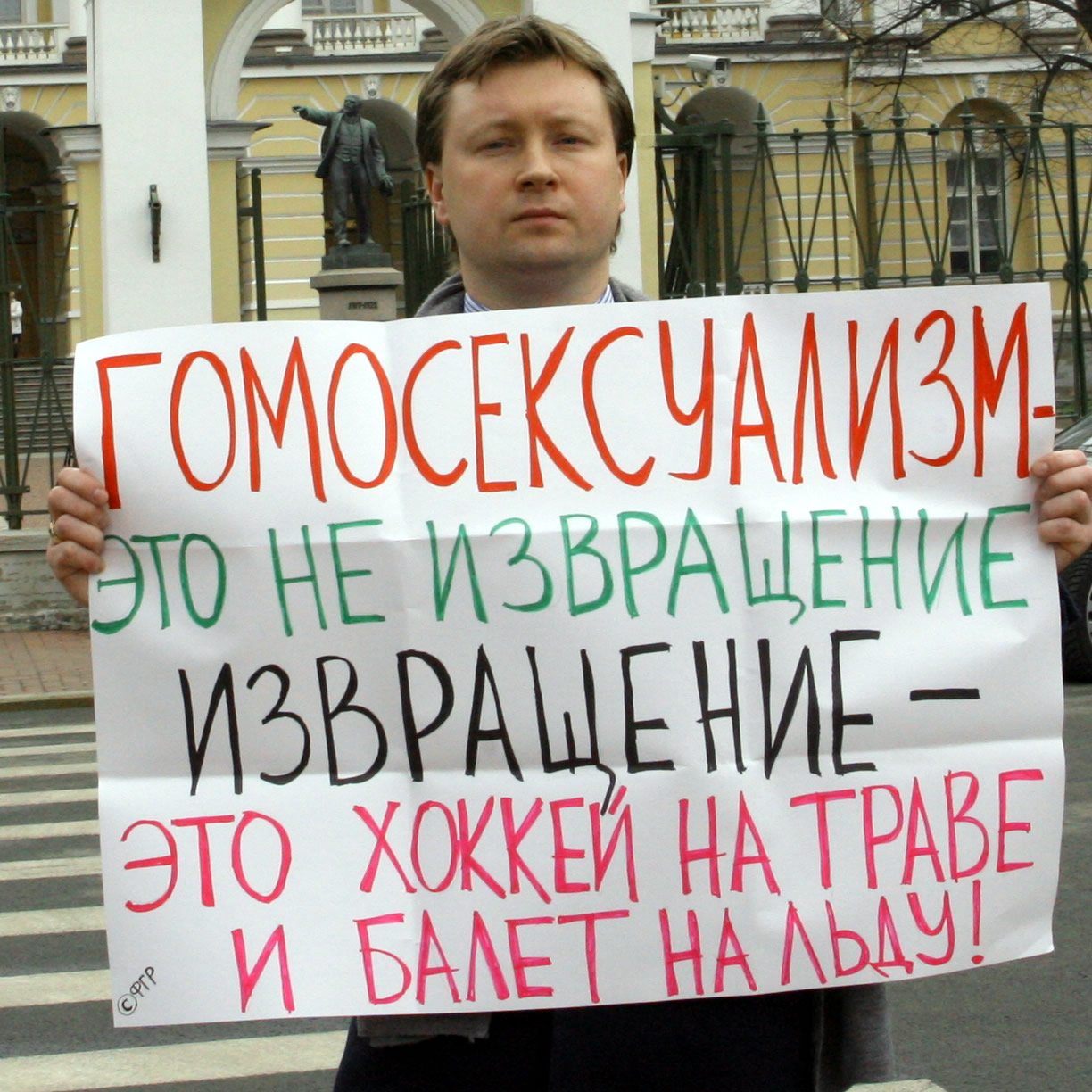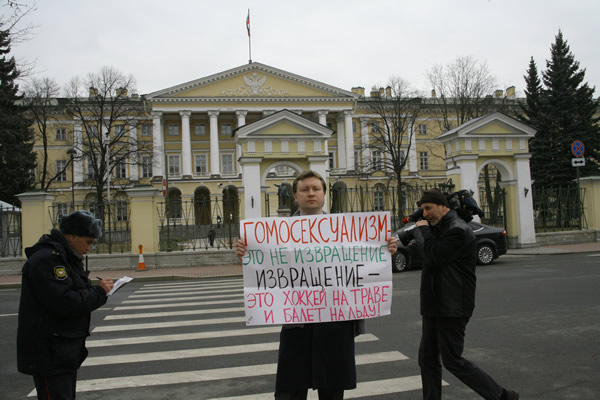News
‘Dangerous’ time in Russia
Violence, anti-gay legislation prompt calls for Sochi Olympics boycott


Nikolai Alekseev in 2012 holds a sign in St. Petersburg that reads “homosexuality is not a perversion. Perersion is grass hockey and ice ballet.” He was fined 5,000 rubles ($154) for violating the city’s ban on gay propaganda to minors. (Photo courtesy of GayRussia.ru)
As LGBT rights advance in the United States, gays in Russia are experiencing the opposite trend: an erosion of rights and a violent backlash against those fighting for equality there.
Russian lawmakers on Tuesday approved a bill that would ban the “promotion of homosexuality” to minors, leading some to urge a U.S. boycott of the 2014 Winter Olympics in Sochi.
The measure passed in the Duma by a 436-0 vote margin with one abstention. Individuals would face fines of between 4,000 and 5,000 rubles ($124-$155,) and government officials would face fines of between 40,000 and 50,000 rubles ($1,241-$1,551.)
Media organizations and other groups would face a fine of up to 1 million rubles ($31,000) or suspension of their activities for up to 90 days. Foreigners could also face up to 15 days in jail and deportation.
Nikolai Alekseev of Gay Russia, an LGBT advocacy group, told the Washington Blade from Moscow on Wednesday he “was expecting” lawmakers would support the measure. He noted programs on Russian television were largely supportive of the measure – and some of its supporters publicly compared homosexuality to pedophilia.
The Federation Council, Russia’s upper house of parliament, still needs to approve the bill, but observers expect it will easily pass.
President Vladimir Putin, who announced his divorce from his wife of 30 years last week, is expected to sign it into law.
“I was sure it would be passed,” Alekseev said. “It will now be signed by the president, who is very much using this fight against homosexuals in his campaign to attract voters.”
The State Department in January criticized the passage of the “promotion of homosexuality” bill on its first reading. The United Nations, Amnesty International and German Chancellor Angela Merkel are among those who have also spoken out against the measure.
“Russia is trying very hard to make discrimination look respectable by calling it ‘tradition,’ but whatever term is used in the bill, it remains discrimination and a violation of the basic human rights of LGBT people,” Graeme Reid, LGBT rights program director at Human Rights Watch, said. “To try to exclude LGBT people as ‘non-traditional’ is to try and make them less than human. It is cynical, and it is dangerous.”
“This is a very sad day for the Russian LGBTI community and for Russian democracy,” Martin K. I. Christensen, co-chair of ILGA-Europe’s Executive Board, added.
The measure passed amid growing concerns over anti-LGBT violence and discrimination in the country.
Two men allegedly sodomized Vladislav Tornovoi with empty beer bottles and set his body on fire near Volgograd on May 10 after he reportedly came out to them. Reuters on June 3 reported authorities on the Kamchatka Peninsula in Russia’s Far East said three men stabbed and trampled a gay man to death late last month before they set his car on fire with his body inside.
Russian lawmakers are also poised to ban foreign same-sex couples from adopting Russian children.
Alekseev said hundreds of skinheads and other anti-gay demonstrators confronted the few dozen LGBT protesters who kissed outside the Duma before Tuesday’s vote. He noted several of the advocates were attacked; and one of them remains in the hospital.
Alekseev said authorities arrested many of the LGBT activists and “didn’t touch any of the anti-gay protesters.”
“We’re quite used to such hostility and to such arrest,” he told the Blade.
Boycott Sochi Olympics?
HereTV.com host Jim Morrison posted a petition to the White House’s website after Tuesday’s vote that calls for a boycott of the 2014 Winter Olympics that will take place in the Russian city of Sochi in February.
“For my country to participate in this is outlandish,” he told the Blade.
A Russian appeals court in March 2012 upheld a lower court ruling that blocked a group that sought to disseminate information on the Russian LGBT rights movement during the Sochi games.
Alekseev, who has appealed the decision to the European Court of Human Rights, noted the country will also host the 2018 World Cup.
He said economic sanctions against Russia is one way to pressure the government to improve its record on LGBT rights and other human rights issues. Alekseev added, however, the international community “should think” before it decides to participate in the Sochi Olympics and the World Cup.
“[They are] a very good opportunity to raise particular concerns,” he said. “One of the ways for many countries would be to boycott these international sporting events because they take place in a country which doesn’t respect basic human rights.”
The United States and other countries boycotted the 1980 Summer Olympics in Moscow in response to the Soviet Union’s invasion of Afghanistan the year before.
Cyd Zeigler, Jr., co-founder of Outsports.com, described the boycott as “the biggest black eye this country has ever self-inflicted.”
“The Olympics are supposed to be apolitical,” he said, noting gay Olympic diver Greg Louganis was unable to compete because then-President Jimmy Carter decided to boycott the games. “To start playing politics by removing an opportunity for these athletes to participate — something they’ve been working for all their lives would be a disgrace.”
Blake Skjellerup, a gay short track speed skater from New Zealand who plans to compete in Sochi, said he would not support a boycott of the games.
“The Olympic games for athletes is something they dream of their whole life and spend their whole life working for,” he told the Blade during an interview on Tuesday night from Calgary where he continues to train. “To have that swept away from underneath you is pretty shocking.”
Gay gymnast Josh Dixon, who finished 13th at the Olympic trials ahead of last summer’s London games, said there would be “nothing more disheartening” than to “discredit the years of work put into accomplishing a goal taken away for political reasons.”
“To have that work taken away, let alone the time it took to reach such a level, would be gut-wrenching,” he told the Blade.
Zeigler and Skjellerup both said they support any athlete who decides to publicly speak out against LGBT rights abuses in Russia.
“I’ll be focusing 110 percent on my competing,” Skjellerup said. “I’m not going to tone down the sort of person that I am just because I’m in a country that has these barbaric laws that exist saying that who I am is wrong.”
The U.S. Olympic Committee did not respond to the Blade’s request for comment.

The Mexican Senate on Thursday approved a bill that would ban so-called conversion therapy in the country.
Yaaj México, a Mexican LGBTQ rights group, on X noted the measure passed by a 77-4 vote margin with 15 abstentions. The Chamber of Deputies, the lower house of Mexico’s congress, approved the bill last month that, among other things, would subject conversion therapy practitioners to between two and six years in prison and fines.
The Senate on its X account described conversion therapy as “practices that have incentivized the violation of human rights of the LGBTTTIQ+ community.”
“The Senate moved (to) sanction therapies that impede or annul a person’s orientation or gender identity,” it said. “There are aggravating factors when the practices are done to minors, older adults and people with disabilities.”
Mexico City and the states of Oaxaca, Quintana Roo, Jalisco and Sonora are among the Mexican jurisdictions that have banned the discredited practice.
The Senate in 2022 passed a conversion therapy ban bill, but the House of Deputies did not approve it. It is not immediately clear whether President Andrés Manuel López Obrador supports the ban.
Canada, Brazil, Belgium, Germany, France, and New Zealand are among the countries that ban conversion therapy. Virginia, California, and D.C. are among the U.S. jurisdictions that prohibit the practice for minors.
The White House
Four states to ignore new Title IX rules protecting transgender students
Biden administration last Friday released final regulations

BY ERIN REED | Last Friday, the Biden administration released its final Title IX rules, which include protections for LGBTQ students by clarifying that Title IX forbids discrimination based on sexual orientation and gender identity.
The rule change could have a significant impact as it would supersede bathroom bans and other discriminatory policies that have become increasingly common in Republican states within the U.S.
As of Thursday morning, however, officials in at least four states — Oklahoma, Louisiana, Florida, and South Carolina — have directed schools to ignore the regulations, potentially setting up a federal showdown that may ultimately end up in a protracted court battle in the lead-up to the 2024 elections.
Louisiana State Superintendent of Education Cade Brumley was the first to respond, decrying the fact that the new Title IX regulations could block teachers and other students from exercising what has been dubbed by some a “right to bully” transgender students by using their old names and pronouns intentionally.
Asserting that Title IX law does not protect trans and queer students, Brumley states that schools “should not alter policies or procedures at this time.” Critically, several courts have ruled that trans and queer students are protected by Title IX, including the 4th U.S. Circuit Court of Appeals in a recent case in West Virginia.
In South Carolina, Schools Supt. Ellen Weaver wrote in a letter that providing protections for trans and LGBTQ students under Title IX “would rescind 50 years of progress and equality of opportunity by putting girls and women at a disadvantage in the educational arena,” apparently leaving trans kids out of her definition of those who deserve progress and equality of opportunity.
She then directed schools to ignore the new directive while waiting for court challenges. While South Carolina does not have a bathroom ban or statewide “Don’t Say Gay or Trans” law, such bills continue to be proposed in the state.
Responding to the South Carolina letter, Chase Glenn of Alliance For Full Acceptance stated, “While Supt. Weaver may not personally support the rights of LGBTQ+ students, she has the responsibility as the top school leader in our state to ensure that all students have equal rights and protections, and a safe place to learn and be themselves. The flagrant disregard shown for the Title IX rule tells me that our superintendent unfortunately does not have the best interests of all students in mind.”
Florida Education Commissioner Manny Diaz also joined in instructing schools not to implement Title IX regulations. In a letter issued to area schools, Diaz stated that the new Title IX regulations were tantamount to “gaslighting the country into believing that biological sex no longer has any meaning.”
Governor Ron DeSantis approved of the letter and stated that Florida “will not comply.” Florida has notably been the site of some of the most viciously anti-queer and anti-trans legislation in recent history, including a “Don’t Say Gay or Trans” law that was used to force a trans female teacher to go by “Mr.”
State Education Supt. Ryan Walters of Oklahoma was the latest to echo similar sentiments. Walters has recently appointed the right-wing media figure Chaya Raichik of Libs of TikTok to an advisory role “to improve school safety,” and notably, Raichik has posed proudly with papers accusing her of instigating bomb threats with her incendiary posts about LGBTQ people in classrooms.
The Title IX policies have been universally applauded by large LGBTQ rights organizations in the U.S. Lambda Legal, a key figure in fighting anti-LGBTQ legislation nationwide, said that the regulations “clearly cover LGBTQ+ students, as well as survivors and pregnant and parenting students across race and gender identity.” The Human Rights Campaign also praised the rule, stating, “rule will be life-changing for so many LGBTQ+ youth and help ensure LGBTQ+ students can receive the same educational experience as their peers: Going to dances, safely using the restroom, and writing stories that tell the truth about their own lives.”
The rule is slated to go into effect Aug. 1, pending any legal challenges.
****************************************************************************

Erin Reed is a transgender woman (she/her pronouns) and researcher who tracks anti-LGBTQ+ legislation around the world and helps people become better advocates for their queer family, friends, colleagues, and community. Reed also is a social media consultant and public speaker.
******************************************************************************************
The preceding article was first published at Erin In The Morning and is republished with permission.
South America
Argentina government dismisses transgender public sector employees
Country’s Trans Labor Quota Law enacted in 2021

Protests have broken out across Argentina in recent weeks after the dismissal of transgender people from their government jobs.
President Javier Milei’s action is in stark contract with the progress seen in 2023, where the government’s hiring of trans people increased by 900 percent within the framework of the Trans Labor Quota Law that had been in place since 2021.
Among those affected is Sofia Diaz, a “survivor” who shared her testimony with the Washington Blade hours after she traveled from Chaco Province to Buenos Aires to protest her dismissal.
Presentes, an LGBTQ news agency, reported the government dismissed more than 85 trans employees in less than two weeks.
Diaz, 49, holds a degree in combined arts. She joined the National Social Security Administration (ANSES) in 2022 under the Trans Labor Inclusion Law. The layoffs began in January and left many people feeling uncertain and anguished. It was her turn a few days ago.
Diaz in an interview recounted how the situation became progressively more complicated, with difficulties in accessing information about her employment status and the eventual confirmation of dismissals through WhatsApp messages. This government action, according to Diaz, violates the law.
“We were on a Friday, I think on March 24, in the office and we have a WhatsApp group of other colleagues from all over Argentina who entered through the trans labor quota and they tell us if we can get our pay stubs on the intranet,” Diaz recalled. “So, I tried to enter, I could not, I talked to two other colleagues and they told me no, they could not, and so we went to another person. He couldn’t either.”
“Some people told us that it could be a system error. Well, we were never calm, let’s say not how this issue of installing fear and the perversion with which they do it ends,” she added. “This sadism of … inflicting pain and speculating with your misfortune and so on … is something that characterizes Javier Milei’s government.”
Diaz recalled a list of those dismissed from the agency began to circulate from the union in the afternoon. A colleague passed it on to her, “and well, unfortunately I was also on that list.”
“At that moment the whole weekend went by with anguish, crying, and talking with other colleagues from other places, not only trans, but everyone, everyone and everyone,” she said. “On Monday when we went to try to enter, we could not enter with the biometric, which is the thumb we had to use every morning to enter.”
Despite the difficult moment through which she is going, the trans activist stressed to the Blade that she will continue protesting and will even sue the government because her dismissal is illegal and “violates the constitution itself.”
The LGBTQ community and its allies have mobilized and organized demonstrations, highlighting the importance of defending the rights won and fighting against discrimination and exclusion. Diaz emphasized the fight is not only for the people affected today, but also for future generations, saying the historical memory of the struggles for inclusion and social justice must be kept alive.
“The Argentine government thus faces a key challenge in human and labor rights, where public pressure and social mobilization can play a determining role in protecting the rights of LGBTQ+ people,” Diaz said.
-

 State Department4 days ago
State Department4 days agoState Department releases annual human rights report
-

 South America2 days ago
South America2 days agoArgentina government dismisses transgender public sector employees
-

 District of Columbia2 days ago
District of Columbia2 days agoCatching up with the asexuals and aromantics of D.C.
-

 Politics4 days ago
Politics4 days agoSmithsonian staff concerned about future of LGBTQ programming amid GOP scrutiny










